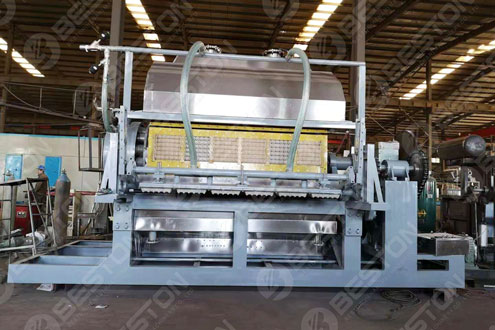The demand for sustainable packaging solutions is driving significant advancements in egg tray machines. These developments are reshaping the industry, enhancing efficiency, reducing waste, and enabling manufacturers to meet evolving environmental and economic challenges. Innovations in egg tray production line technology and pulp molding equipment are at the forefront of these changes, promising a more sustainable and efficient future.
Advanced Automation in Egg Tray Production Lines
Automation has become a cornerstone of modern manufacturing, and the egg tray production line is no exception. Fully automated systems are now equipped with cutting-edge features such as intelligent control panels, real-time monitoring, and adaptive process adjustments. These capabilities improve production precision and reduce downtime caused by manual interventions.
Enhanced automation also allows manufacturers to scale production while maintaining consistent quality. By integrating robotic arms for material handling and advanced mold-changing mechanisms, egg tray production lines can swiftly adapt to varying output requirements. This level of flexibility ensures that businesses remain competitive in an ever-changing market.
Innovations in Pulp Molding Equipment
Pulp molding equipment has seen remarkable technological advancements, particularly in material efficiency and mold design. Modern systems are designed to optimize the use of recycled paper and other fibrous materials, ensuring minimal waste generation during the production process. Enhanced drying and forming technologies further improve resource utilization, making these systems more eco-friendly.
Precision mold engineering has also emerged as a key focus area. New molds can produce intricately designed trays that cater to specific industry needs, from standard egg trays to custom packaging for other delicate goods. The durability and accuracy of these molds contribute to reduced wear and tear, ensuring long-term operational efficiency.
Reducing Energy Costs with Advanced Egg Tray Dryers
Egg tray dryer plays a pivotal role in the production process, and advancements in drying technology are addressing the need for energy efficiency. Modern dryers, such as multi-layer metal and brick-lined systems, are designed to optimize heat distribution, reducing fuel consumption and drying time.
Innovative heat recovery systems are now integrated into egg tray dryers, capturing waste heat and repurposing it for other stages of production. This not only lowers energy costs but also contributes to reducing the carbon footprint of the manufacturing process, aligning with global sustainability goals.
Affordability and Accessibility
As technology evolves, the paper egg tray making machine price continues to become more accessible for businesses of varying sizes. Manufacturers are now offering modular designs that allow businesses to start with basic setups and expand as production demands grow. This scalability reduces the initial investment burden while providing room for future enhancements.
Government incentives and increasing demand for eco-friendly packaging have also made it more feasible for small and medium enterprises to adopt modern egg tray machines. This democratization of technology is fostering wider adoption, enabling a broader impact on sustainability.
Sustainable Trends and Industry Outlook
The future of egg tray machines is closely aligned with global trends in sustainability and resource efficiency. The emphasis on using recycled materials, reducing energy consumption, and creating biodegradable products is shaping the direction of the industry. Emerging technologies like AI-powered monitoring and IoT-enabled systems are expected to further optimize production and maintenance processes, ensuring seamless operations.
Conclusion
The evolution of egg tray machines is transforming the packaging industry, driving innovation in pulp molding equipment, production lines, and drying systems. These advancements not only enhance operational efficiency but also support sustainable manufacturing practices. As the industry continues to evolve, businesses can expect lower production costs, greater scalability, and improved environmental outcomes. The integration of these technologies promises a future where egg tray production is both economically viable and environmentally responsible.


